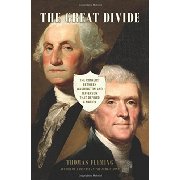
Follow Up to Thomas Fleming Interview
At WWTFT we have been privileged to speak with notable and learned scholars like Thomas Fleming. In our interviews, we try to extend the knowledge we’ve gained from reading their work, by asking questions about items of particular interest to us, and hopefully our readers.  In the course of a review, we necessarily omit some things and emphasize others. Admittedly, there are times when both may be the result of an inclination toward (or opposition to) a particular point of view, at other times such omissions or emphases are merely due to constraints on space. When in disagreement, we try to take those disagreements head on. On the other hand, sometimes it’s better not to quibble over minor differences in opinion.
In all cases, we are mindful of the time and energy required to research and assemble a work of history. Our questions (generally) do not come from any desire to assert expertise we don’t possess. Rather, they are based on our understanding and the conclusions we’ve drawn based on what we do know. In an effort to attain a bit more clarity about some of Mr. Fleming’s responses, we asked some follow-up questions. And we’re glad we did!
Marcia: You expressed admiration for Woodrow Wilson’s assessment of the dangers of Congressional overreach. I can certainly see that the system has run amok, but it seems like Wilson was partial to an Imperial Presidency, or isn’t that correct?
In 1891 Wilson argued:
Give us administrative elasticity and discretion “free us from the idea that checks and balances are to be carried down through all stages of organization.â€
He was advocating for the administrative state. As he saw it, only an unfettered government would be able to “adjust continually to meet the new demands of new ages.â€
 Thomas Fleming: I expressed agreement with, not admiration for Wilson’s analysis of the fundamental flaw of congressional government. My opinion of Wilson is not high, as you will discover if you read my book, The Illusion of Victory, America in World War I. By and large I agree with JFK, who told Arthur Schlesinger that in any ratings of presidents, Wilson should be fourth or fifth from the bottom.
Thomas Fleming: I expressed agreement with, not admiration for Wilson’s analysis of the fundamental flaw of congressional government. My opinion of Wilson is not high, as you will discover if you read my book, The Illusion of Victory, America in World War I. By and large I agree with JFK, who told Arthur Schlesinger that in any ratings of presidents, Wilson should be fourth or fifth from the bottom.
Marcia: Wilson and the progressives wholeheartedly endorsed Frank Goodnow’s Comparative Administrative Law, published in 1893.
Before we can hope that administrative officers can occupy a position reasonably permanent in character and reasonably free from political influence, we must recognize the existence of an administrative function whose discharge must be uninfluenced by political considerations.
As I understand him, that means governing independently from the elected branches of government. Doesn’t that pretty much do away with consent of the governed?
Thomas Fleming: Wilson had a lot of grandiose ideas, most of them bad — or at least far beyond his ability to make them work. I agree that there are times when the administrative state seems to be a reality. But it must and can be responsive to the thinking and feelings of the electorate. We are now in the aftermath of our second era of congressional government. You should read my article, The Imperial Congress, in American Heritage. It’s available on their web page.
Marcia:  In his new book, By The People, Charles Murray suggests that the administrative state is already here. It is the invisible 4th Branch of government administered by experts, unelected and unaccountable, created when Congress delegated its legislative power to the Executive branch.  If Murray is right, then we’re both off base, thinking that reigning in Congress or the Presidency will do much to improve the status quo. Do you agree with Murray’s analysis?
Thomas Fleming: I don’t think any administrator or group of them can govern without the consent of a large percentage of the governed. Not ultimately. They can get away with it for a while but it won’t last. I refrain from apocalyptic worries like these. I remain an optimist about the American nation.
Marcia: You expressed admiration for Jefferson, Madison and Washington. They were indeed remarkable! At WWTFT, we contend that the principles and philosophies that went into our Founding have stood the test of time and are still relevant for today. It doesn’t seem that Wilson agreed.
“While we are followers of Jefferson, there is one principle of Jefferson’s which no longer can obtain in the practical politics of America. You know that it was  Jefferson who said that the best government is that which does as little governing as possible…. But that time is passed. America is not now and cannot in the future be a place for unrestricted individual enterprise.â€
That is Wilson’s solution to corruption and broadly, economic inequality. What am I misconstruing?
 Thomas Fleming: Re the founders. I have a limited admiration for Jefferson, a larger admiration for Madison, and a very large admiration for Washington. That is the essence of The Great Divide. As a governor of men, Jefferson was second rate, with so many awful ideas. That’s why I call him the “UnWashington president.” Founders are important, but the word is not magical to me. Away back in 1776, I was writing a book on that pivotal year. I had spent years researching it but I didn’t have a theme, a fundamental insight. Then it came to me (along with the title of the book) 1776: Year of Illusions. These founders, most of them anyway, all bought the fatally wrong strategy recommended by that epic blowhard, Tom Paine. We could win the war in one big battle, a “general action” because the British were too broke to send a large army and fleet to America. After a very large British army clobbered the Continental Army twice that summer. everyone was in despair == except Washington. He decided to change the strategy of the war. Henceforth America would never put “everything to the risk” in one battle. Instead, they would protract the war. It took another sevfen years but it was the formula for victory.
Thomas Fleming: Re the founders. I have a limited admiration for Jefferson, a larger admiration for Madison, and a very large admiration for Washington. That is the essence of The Great Divide. As a governor of men, Jefferson was second rate, with so many awful ideas. That’s why I call him the “UnWashington president.” Founders are important, but the word is not magical to me. Away back in 1776, I was writing a book on that pivotal year. I had spent years researching it but I didn’t have a theme, a fundamental insight. Then it came to me (along with the title of the book) 1776: Year of Illusions. These founders, most of them anyway, all bought the fatally wrong strategy recommended by that epic blowhard, Tom Paine. We could win the war in one big battle, a “general action” because the British were too broke to send a large army and fleet to America. After a very large British army clobbered the Continental Army twice that summer. everyone was in despair == except Washington. He decided to change the strategy of the war. Henceforth America would never put “everything to the risk” in one battle. Instead, they would protract the war. It took another sevfen years but it was the formula for victory.
When I wrote my history of West Point, I asked numerous generals what they thought of Washington. They all said the same thing: he was a great general. He changed the strategy of the war. Behind this tribute lurks the other founders, Adams, Madison, Franklin, Jefferson, who were all acquiescent in the illusion of a short victorious war. Very early I learned to dislike all versions of what I call “The Golden Glow” version of the Revolution. These were very human men, who disagreed with each other and were not easily reconciled. Take Jefferson. By the time Washington died, Tom hated him so much he avoided going to his funeral. And he was vice president at the time!
Marcia: Do you agree with Wilson that the administrative state, run by “experts†can make better decisions than individuals or that, for the greater good, it should? This might seem to be a leading question, but maybe the answer to it depends on the time to which it is applied. I don’t think that Wilson was correct in his thinking at the time. In all honesty, do we now have a citizenry capable of self-governance?
Thomas Fleming: My father was a politician. He was leader of a ward in Jersey City, which was run by a Democratic organization for 30 years. They had a boss and the NY Times and other pundits never stopped sneering at them. But they were very capable of self governance. So capable, they — and similar politicians in other cities — lifted a whole class of hitherto despised and very poor people — many of them Irish-Americans — into the middle class. That’s governance, in the nitty-gritty sense of that word. We’ll always have it, one way or another
 The posts are coming!
The posts are coming!


0 comments
Kick things off by filling out the form below.
Leave a Comment